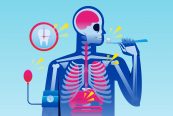The future of teaching oral hygiene will be hands-on. Curaden Academy held an iTOP workshop at the Association for Dental Education in Europe’s (ADEE) Annual Meeting, the most important conference on dental education in Europe.

Curaden Academy and the ADEE join hands
Updating the curricula of dental students seems more necessary than ever. With its Global Oral Health Action Plan 2023-2030, The World Health Organisation has recognised oral disease as a major health burden due to its shared risk factors with other non-communicable diseases. In addition, the oral health-related knowledge, attitudes, and behaviours of dental students are increasingly being studied, and the results point to a need for more prevention and guidelines in their curricula.
“How are you supposed to know how to brush your teeth if no one’s ever shown you?”
Curaden Academy’s workshop at the ADEE’s Annual Meeting in Liverpool discussed exactly this issue. The workshop was the result of a recent partnership between Curaden Academy and the ADEE, and discussed integrating iTOP into the curricula of dental universities. Led by prof. Isabel Martinez Lizan from the University of Barcelona, participants explored how Dr Jiří Sedelmayer’s programme for individually trained oral prophylaxis could transform oral hygiene education.
Bridging the gap
“How are you supposed to know how to brush your teeth if no one’s ever shown you?” The reaction of one audience member hit the nail on the head. It is evident that insufficient time is devoted to practical oral hygiene skills, leading to a noticeable gap between theory and practice—an issue that can become painfully clear in a clinical setting. After all, the effectiveness of instructions hinges on the dentist’s own oral hygiene habits. “However,” the same audience member noted, “motivating patients in the long term is the real challenge.”

Indeed, no two patients are identical, coming from various socio-economic backgrounds. In this context, Oral health habits stand out as a distinct marker of inequality. The audience agreed that alongside offering guidance, education should act as a bridge between the students and the community in which they operate.
It is crucial for dental professionals to understand how inequality affects patients’ capacity to follow clinical guidelines. The fact that the relationship between dental professionals and patients often leans towards being one-sided is an obstacle. However, the interactive nature of iTOP can present an opportunity to disrupt this power imbalance. It can function as a method for presenting the patient’s viewpoint, attentively listening to them, and empower them.

Prof. Martinez aptly concluded, “The health landscape may vary from country to country, but it is important to exchange experiences. I want the attendees here today to know there is a way to put prevention into practice. We can achieve excellence, but it takes time and resources.”


